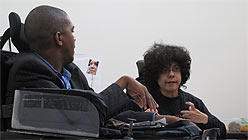We live in a culture where a nearly everyone has to grapple with a sanitized, narrow ideal of human sexuality — one that looks more like Ken & Barbie than anything resembling actual people having sex. For those with disabilities, the sense of exclusion is even more intense. After all, very few movies, magazines, or TV shows depict people with disabilities in a realistic manner. Even in the liberal, creative community of the Bay Area, it’s relatively rare to find a platform for artists with disabilities.
On top of that, a subtle bias can live in the heart of even the most well-meaning able-bodied people — a tendency to look at people with disabilities with pity, to focus on the disability and not the common humanness. Hence, those with disabilities feel alienated, or worse, invisible. And one of the most insulting misconceptions is that people with disabilities can’t, or don’t, have sex.
“It’s incredibly painful” to have this aspect of your human nature dismissed, says Patty Berne, artistic director of non-profit arts organization Sins Invalid. In 2005, she and Leroy Moore co-founded the performance project as a platform for artists with disabilities to make their sexual identities and journeys known. Because ethnic minorities and members of the LGBT community face the same sort of exclusion when it comes to mainstream images and stories of love and lust, Sins Invalid gives priority to artists who identify themselves as queer, as gender variant, or as a member of another minority.
“The idea of presenting beauty and disability and sexuality is sadly seen as incongruous, and we know that not to be the truth in any way, shape, or form,” Berne says. “We know the truth is, of course, all of us are beautiful and valuable. Based on the response we’ve gotten, it’s clear to me that a lot of people are hungry for that message. It’s a pretty straightforward thing to me, but it’s sadly not represented in the mainstream culture very broadly or deeply.”
This weekend, Sins Invalid will present its first-ever Artists-in-Residence showcase. A few years ago, the Sins Invalid artistic core realized that there aren’t many opportunities for artists with disabilities to refine raw talent, or to learn how to translate their work to a professional stage show. Thus, in 2010, the organization launched its first residency program with singer, writer, and voice coach Nomy Lamm at the helm. Unlike the regular showcases, this event, titled Resident Alien, does not focus on the performer’s journey of sexual discovery, even though it is sexually frank.


